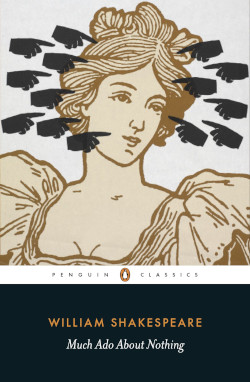William Shakespeare, Much Ado About Nothing, 1598

William Shakespeare’s romantic comedy Much Ado About Nothing was written around 1598, when Shakespeare’s company was still at the Curtain playhouse. Early performances included one of the period’s greatest comic actors, Will Kemp, in the role of Dogberry, and the play was published within two years (a rare occurrence at that point in Shakespeare’s career). It also had great longevity, being revived at Whitehall Palace in 1612–13 as part of the festivities for the wedding of Princess Elizabeth to Frederick V, Elector Palatine – alongside some perhaps dubious choices for celebrating impending nuptials.
For all its fame as a light-hearted romp, Much Ado is potentially quite a dark play. If love prevails, it’s in the least likely of ways, and against the odds – Beatrice and Benedick’s relationship is unconventional and arguably not the union the play sets us up to demand as closure. We are conditioned to expect Hero and Claudio’s union to offer the resolution we crave, but it is deeply unsatisfying and generic when it comes, and one can’t help feeling Hero has drawn the short straw. In a world governed by superficiality, by surface-level beliefs and behaviours, the only ray of hope comes from the couple whose superficial projection of dislike for each other masks a genuine affection that they hadn’t originally recognised or been honest with themselves about. Their growth as individuals, through which they let down their guards and acknowledge their feelings, represents the genuine warmth at the heart of the play and offers a glimpse of hope for the people of Messina to move beyond their shallow existence.

Associate Professor David McInnis
Associate Professor David McInnis is the author of Shakespeare and Lost Plays (2021) and Mind-Travelling and Voyage Drama in Early Modern England (2013).
He has edited Thomas Dekker’s Old Fortunatus for the Revels Plays series (2020) and Dekker’s If This Be Not a Good Play, The Devil Is In It for The Routledge Anthology of Early Modern Drama (2020). With Matthew Steggle and Misha Teramura, he is co-editor of the Lost Plays Database, which he founded with Roslyn L. Knutson in 2009.
He has also edited a number of books, including Lost Plays in Shakespeare’s England (2014), its sequel volume Loss and the Literary Culture of Shakespeare’s Time (2020), Travel and Drama in Early Modern England: The Journeying Play (2018), Tamburlaine: A Critical Reader (2020), and Shakespeare and Virtual Reality (2021). He is currently editing Timon of Athens for the fourth series of The Arden Shakespeare.